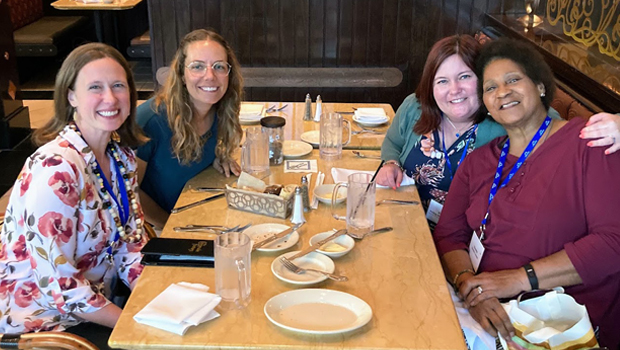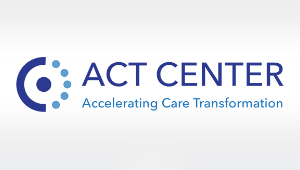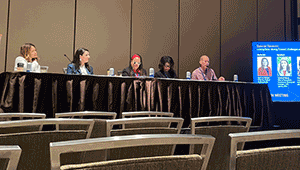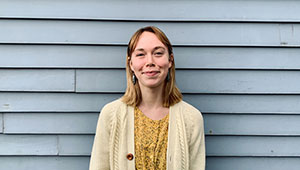Patient partners: A missing ingredient at conferences?

Starette Canada (front right) enjoys lunch with Claire Allen, Jess Mogk, and Kelsey Stefanik-Guizlo (l-r) during AcademyHealth's Annual Research Meeting.
Starette Canada, a patient partner, shares her experience attending a recent academic conference and highlights gaps that remain in patient engagement
Patient partners work alongside staff members as equals at the Center for Accelerating Care Transformation (ACT Center), which is part of Kaiser Permanente Washington Health Research Institute (KPWHRI). They share their perspectives and experiences to design and tailor better solutions to improve health care. But at research conferences and meetings — where staff members have ample opportunities to share knowledge with other conference attendees — do patient partners have the same opportunities?
We recently talked with ACT Center patient partner Starette Canada about how patients can be elevated in research and at research meetings, and why this is important. Canada is a Kaiser Permanente Washington member living with persistent pain, who first heard about the ACT Center through Kaiser Permanente Washington’s Living Well program. Now, Canada is a dedicated member of the Integrated Pain Management (IPM) program team, which is co-designed and led by a team of ACT Center researchers and staff from KPWHRI alongside 4 Kaiser Permanente Washington patient partners. The IPM team works to improve quality of life, functioning, and well-being of people with persistent pain by providing safe alternatives to opioids. In addition to her work with the ACT Center, Canada serves on Kaiser Permanente’s National Women's Health BIPOC Advisory Council and National Cancer Advisory Board, as well as Kaiser Permanente Washington’s Senior Caucus and Patient Advisory Group.
Canada and ACT Center team members Claire Allen, MPH, and Kelsey Stefanik-Guizlo, MPH, sat down to talk about their experiences at AcademyHealth’s Annual Research Meeting (ARM) in June, and how patient partners deserve a platform to share about their engagement with research projects. Allen and Stefanik-Guizlo were excited to bring Canada to her first academic conference. Jess Mogk, MPH, an ACT Center team member, also attended with them.
Giving patient partners a platform
Throughout the 4-day conference, Canada and ACT Center members attended many presentations and said they found limited examples of substantive patient engagement in research. Some presentations talked about engaging with patients and AcademyHealth offered a scholarship program for patients who wanted to attend the conference, but there were no presentations from patient partners or any meaningful ways for them to engage with the presentations or with each other.
“Patients are a key part of research! Some of the presentations made it feel like data is the only crucial part of research, and not those who provide the reason for research: the patients. I wish we’d seen patient partners speak or host a breakout session where patient partners give feedback on research taking place,” said Canada. “If patient partners were given a platform, researchers would be able to see that we help them see the real-life impact of their work.”
Stefanik-Guizlo noted that It's not commonplace to see patient partner engagement at academic research conferences and that giving patient partners a platform to share their experiences would bring many benefits. “Having Starette with us made me take a step back and ask myself why we are doing the research we are doing — for me, the answer is we do this work to improve care for people,” she said. “We have such a wonderful opportunity to hear from patients who can help us make improvements to care. I hope we can get to a point where patient partners come to these conferences and see their place in research valued and have the option to talk about their work.”
If given the chance to partner with planners and presenters at research conferences, Canada said she would make sure patient partners had the same opportunities as researchers to share their knowledge and expertise.
Research must be more accessible
Research conferences are often academic, but is academia preventing patient partners from seeing their place among the researchers? While some presentations discussed patient partners, Canada, Stefanik-Guizlo, and Allen felt that most left a gap on how to share patient partner work and Canada said they missed the most important aspect — being human.
“Some of the presentations felt like they were in Klingon and that made it hard for me to digest what they were saying,” Canada said, explaining that she doesn’t speak the academic language. “There were times when I had questions or wanted to make a comment, but feared the spectacle of getting up with a cane and painfully walking to the microphone. Gratefully, Claire, Kelsey, and Jess relayed any questions I had and were also able to explain things to me.”
Canada believes patient partners have a place at conferences like ARM, and that having patient partners involved in planning may be the first step in making nonacademics feel more welcome in those settings.
At past research meetings, Allen said she has focused on the research, but having Canada with her provided a fresh perspective on basic accessibility.
“Starette uses a cane, and we hit roadblock after roadblock with accessibility,” said Allen. “We had to search everywhere for elevators and there was no seating for meals. Of course, Starette handled it with grace, as I’m sure these are common experiences for her, but it opened my eyes. Those moments helped me critically examine the meeting from her perspective and brought a human and personal touch to such an academic event.”
Teamwork makes the dream work
At the end of the conference, Canada, Allen, and Stefanik-Guizlo all agreed they discovered so much from their shared experience of attending ARM together. They attended presentations, networked, and shared meals — as well as a fit of giggles in the revolving door. At the center of it, they strengthened their bond, an essential component of good teamwork.
“I felt so much love from Claire, Kelsey, and Jess. The IPM team is as real to me as my home. Spending time with people who welcome me, talk to me, and listen to me is lovely,” said Canada. “This experience filled me with so much love and togetherness.”
By Marya Purrington
This was adapted from a story was originally published on the ACT Center website.
Visit the ACT Center

Moving research into action, together
KPWHRI’s Center for Accelerating Care Transformation improves health for people and communities by streamlining the path from research to practice.
News

KPWHRI research highlighted at AcademyHealth’s Annual Research Meeting
At the annual meeting, several KPWHRI researchers shared recent study findings.
Partnering with patients

5 lessons from co-designing with patient partners
Sarah Brush shares insights on engaging KP members in a Learning Health System project to revamp chronic pain care.
News

Toolkit offers guidance for people with persistent pain
The new comprehensive resource was written from the perspective of patients experiencing ongoing pain.


